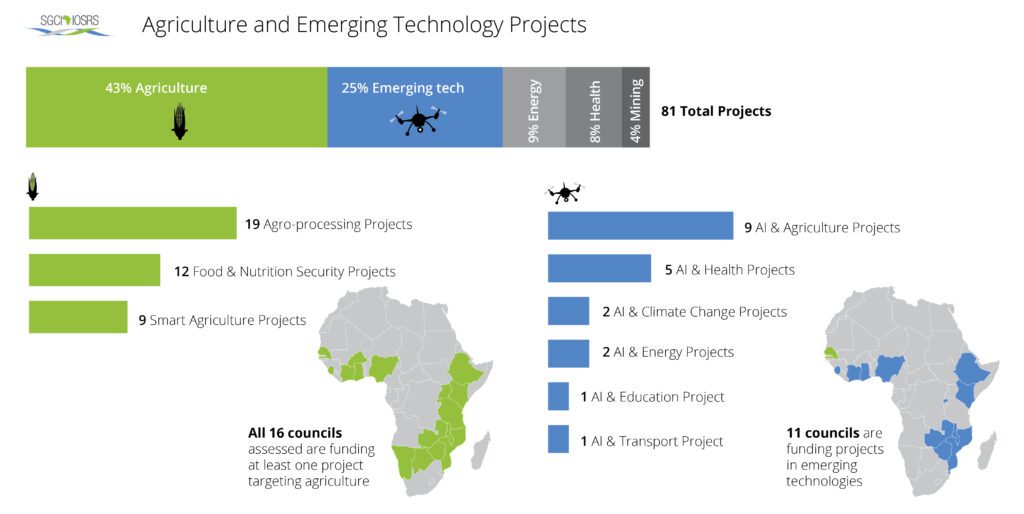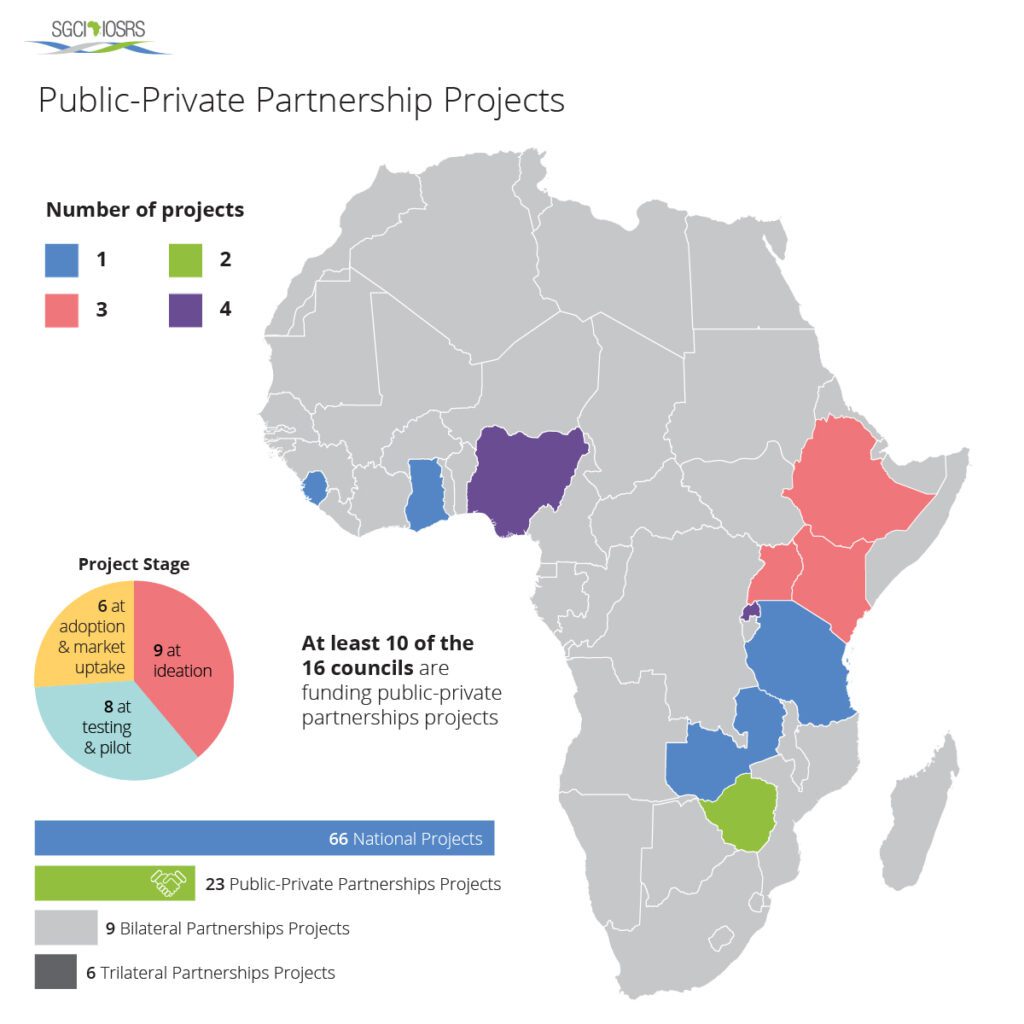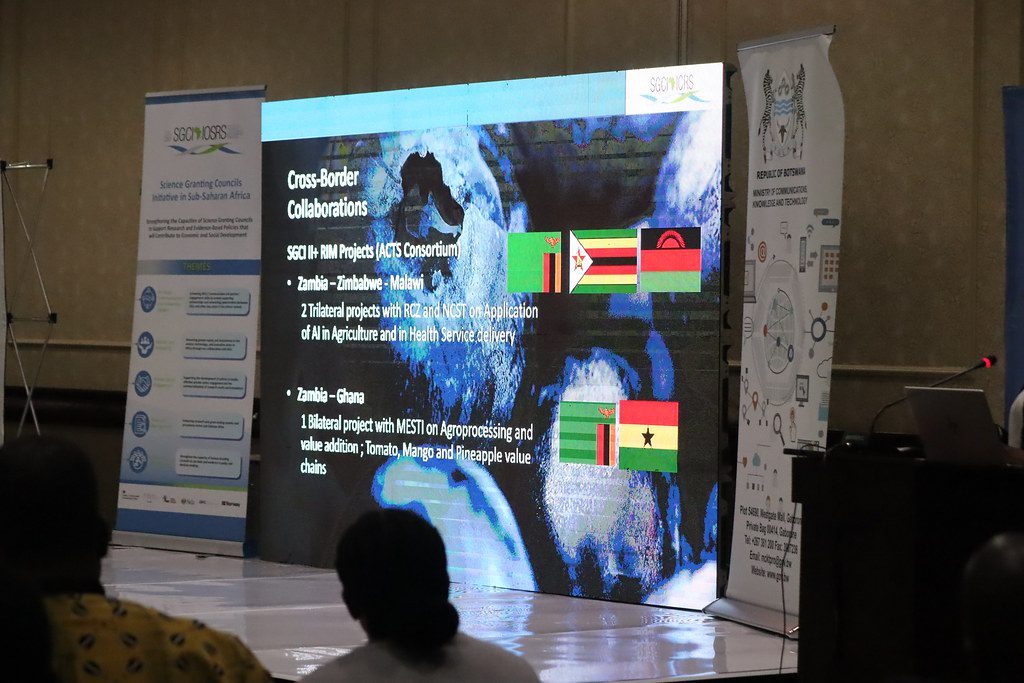SGCI News
The Science Granting Councils in Africa are national agencies responsible for funding and promoting research and innovation. Above all, they support scientific development. They do this by allocating resources, fostering…
The Science Granting Councils in Africa are national agencies responsible for funding and promoting research and innovation. Above all, they support scientific development. They do this by allocating resources, fostering collaboration and strengthening research capacities across Africa. Their aim is to boost scientific output and innovation to address societal challenges. In this blog, we review Science Granting Councils’ projects. How are they funding research and innovation projects? Which projects are they managing? And what progress are they making?
What types of projects do Science Granting Councils work on?
Data collected by the African Centre for Technology Studies (ACTS) shows that between 01 January 2023 and 30 September 2024, the Science Granting Councils selected 81 research and innovation projects for funding. Of these, 66 were national projects, while 15 were multi-country collaborations. The collaborative projects included nine bi-lateral and six tri-lateral initiatives. Additionally, 23 of the projects were Public-Private Partnerships (PPP). This highlights a strong emphasis on cooperation across borders and sectors.
The Science Granting Councils prioritized five areas: agriculture, emerging technologies, energy, health and mining. Collectively, these five areas represented 90% of all funded projects. Out of the total of 81 projects, agriculture led with 34 projects (43%). This was followed by emerging technologies at 20 projects (25%) and energy at seven projects (9%). Health (six projects) and mining (three projects) made up the remaining initiatives. The remaining 10% of funded research covered a number of other areas. This included water with two projects, and the environment, education and social science, each represented by one project.
Projects on agriculture and emerging technologies
All sixteen Science Granting Councils assessed have funded at least one project focused on agriculture. Furthermore, no specific region showed a greater emphasis on this sector. Within agriculture, agro-processing projects dominated, accounting for 19 projects (56%). This was followed by food and nutrition security with 12 projects (35%). Then climate-smart agriculture technologies followed with three projects (9%). These areas reflect a broad commitment to advancing agricultural innovation, food security and sustainability across the continent.

Emerging technologies have rapidly gained traction among Councils. Around a quarter of funded projects (20 out of 79) focus on emerging technologies. Notably, 68% of Councils (11 out of 16) supported initiatives in this field. These projects addressed challenges across various Sustainable Development Goals (SDG). Among them, Artificial Intelligence (AI) played a prominent role in funded projects.
The application of AI in agriculture led with nine projects, followed by five in health. Additional AI initiatives included two projects each for climate change and energy, and one project each in education and transport. Countries actively funding these projects included: Cote d’Ivoire, Ethiopia, Ghana, Kenya, Malawi, Mozambique, Nigeria, Rwanda, Sierra Leone, Zambia and Zimbabwe.
Public-Private Partnership projects
Public-Private Partnerships (PPP) have been a significant focus for Councils. Of the 79 selected projects, 23 were PPP initiatives. Notably, 10 of the 16 Science Granting Councils assessed actively funded PPP projects. These initiatives spanned various stages of development, with nine projects (39%) in the ideation phase. A further 8 projects (35%) were at the testing and piloting stage. Another six projects (26%) reached the adoption and market uptake stage. Rwanda and Nigeria lead in PPP projects with four projects each. This was followed by Ethiopia, Kenya, and Uganda with three each. Zimbabwe had two. And Ghana, Sierra Leone, Tanzania and Zambia each had one funded PPP project.

What conclusions can we draw about Science Granting Councils research focus?
Preference for national projects
The SGCI has encouraged Councils to fund collaborative research projects. However, the preferred model remains funding of national projects that are aligned to national development agendas. The low number of intra-African research collaborations must be addressed. While there are numerous North-South collaborations, fewer intra-continental ones exist. More efforts are required by all stakeholders to enhance research collaborations and reap rewards. Partnerships can help to bring solutions to cross-sectoral development and social issues.
Science Granting Councils’ focus on agriculture
It is not surprising that more Science Granting Councils opted to fund a high number of projects in agriculture. Several African governments, including Zambia, Zimbabwe, Malawi, Burkina Faso, Ethiopia, Senegal, Kenya, and Uganda, have prioritized agriculture as a key sector. This is pegged on the countries’ national policies aimed at enhancing agriculture for food security. This trend is expected to continue in the near future. While this is positive, duplication and overlap among agricultural projects exists. This is due to a lack of a coordination mechanism. At present, the lack of coordination has caused several Councils to support projects that address the same issues in agriculture. A better approach might be to set up systems that help to prevent duplication.
Agro-processing is a vital step to industrialization
It is commendable that many Science Granting Councils have selected to fund more agro-processing projects. This is a step in the right direction. Agriculture is a good option for Africa when it comes to industrialization. Furthermore, in many African countries, agriculture provides up to 50% of the inputs for manufacturing. Agriculture and manufacturing are mutually supportive, with one helping the other to thrive. Investing more in agro-processing research and innovation is a win-win situation for both sectors.
Increasing interest in emerging technologies
An increasing number of Science Granting Councils are opting to fund projects in emerging technologies. This demonstrates how keen they are to tap into the new opportunities that these technologies can provide. Furthermore, technology can help to progress the national development agendas of these countries. More investments in these areas should be encouraged to help address societal challenges even further.
Increasing interest in public-private partnerships
A need exists to invest in public resources and stimulate collaborations between academia and industry. We have seen a steady increase in the Science Granting Councils’ appreciation of this. The main vehicle for achieving this objective is funding PPP projects. Enhancing uptake of academia-developed solutions by industry is critical. Working with industries to co-create and implement projects is one of the best ways of achieving this. Currently, the number of PPP projects remains less than 30%. While the trend is positive, more investment is needed in future. This will ensure parity between investing in research projects and PPP-related projects.
To learn more about the project click here
Related News
How Zambia’s science council is funding research that matters
When Zambia’s National Science and Technology Council (NSTC) was established in 1997, its founding vision was to harness science, technology, and innovation to improve the lives of ordinary Zambians. More than two decades later, that vision is increasingly taking shape through a growing portfolio of…
Voices of SGCI: Council leaders on the direction and ambition of SGCI 3
At the African Union’s Science, Technology and Innovation Week in Addis Ababa, earlier this month, leaders of science granting councils reflected on what SGCI Phase 3 represents for Africa’s science and innovation systems. From ownership and alignment to stewardship and sustainability, here are their voices…
Building Africa’s science future: inside the SGCI alliance
As Phase 3 of the Science Granting Councils Initiative launches on the margins of the African Union Summit in Addis Ababa last week, the SGCI Alliance Chair explains why this moment marks a decisive turning point for African science. Cephas Adjei Mensah describes what is…
SGCI funded projects
Rwanda’s integrated approach to sustainable agriculture and nutrition
Project Titles & Institution Areas of Research Number of Projects being funded Project Duration Grant Amount In-Kind Distribution Council Collaboration with other councils





